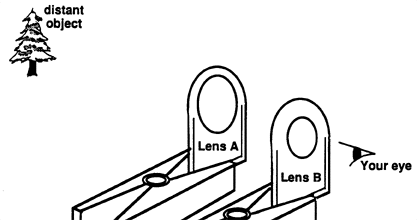Optics Discovery Kit
Experiment #4 :
KEPLERIAN TELESCOPE
EQUIPMENT: Lenses A and B and Two Clothes pins
|

|
| CAUTION! DO NOT LOOK AT THE SUN!
|
|
|
MAGNIFY
IMAGES
|
Hold lens B very close to one eye so that it almost touches your
eyebrow. Put lens A directly behind and very close to lens B so that
you can look through B at A. With your other eye closed, aim the
lenses toward some distant object and very slowly move lens A away
from lens B (keep lens B right at your eye). At some point you
should see a sharp (focused) image of the distant object appear. By
using the clothespins as holders, you can make the lenses stand up
on a table to get a steadier image.
1) Describe the image that you see compared to the object.
2) Draw the image on paper so that your drawing seems the same
size as the image you see. Also draw on the paper the object the size
it appears when you look at it without using the lenses.
3) Measure the length of each of your two drawings to find out how
much this TELESCOPE you have made magnifies the distant
object.
4) How is this telescope different from the one you made in the last
experiment?
|
|
|
HOW IS THIS USEFUL?
|
Telescopes can be designed using several different combinations of lenses. Each style has some advantages and disadvantages. For example, some produce images which are right-side up and others do not. Some produce greater magnification than others. Some allow you to see more area at one time. Binocular makers who use the lens arrangement that you just used will usually add other optical devices to turn the image right-side up.
|
|
List of Other Experiments
Page authored by the ACEPT W3 Group
Department of Physics and Astronomy, Arizona State University, Tempe, AZ 85287-1504
Copyright © 1995-2000 Arizona Board of Regents. All rights reserved.
Optics Discovery Kit © the Optical Society of America
URL: http://acept.la.asu.edu/PiN/opticskit/expt/experiment4.shtml
|
|

